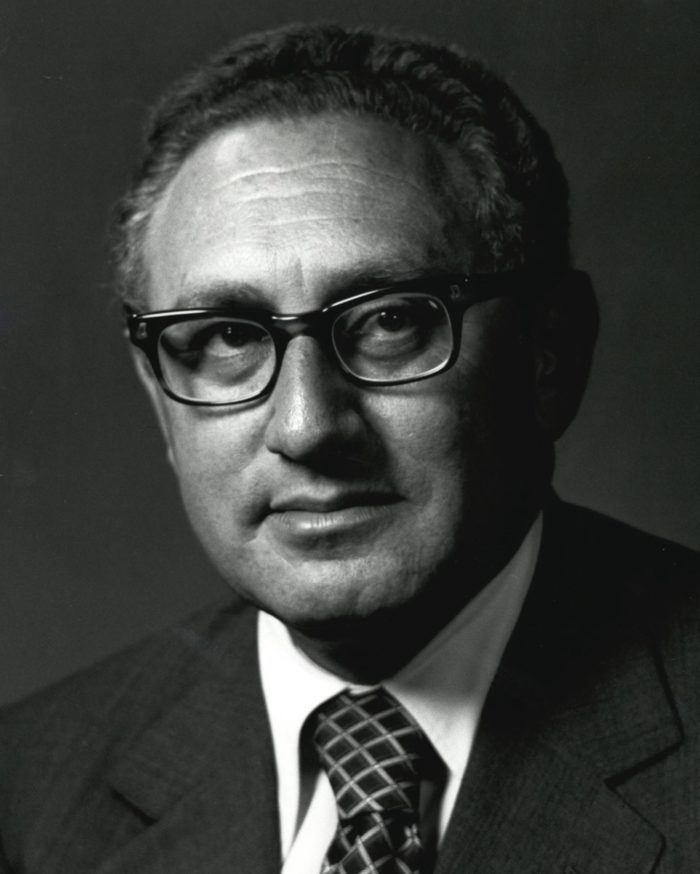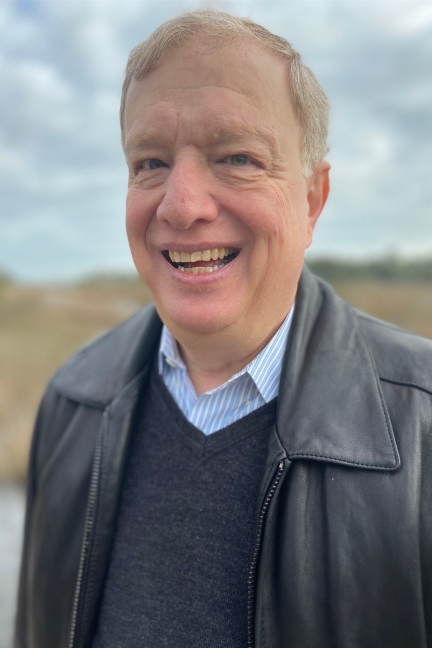by Thomas A. Schwartz
Over the past six decades, Henry Kissinger has been America’s most consistently praised—and reviled—public figure. He was hailed as a “miracle worker” for his peacemaking in the Middle East, pursuit of détente with the Soviet Union, and negotiation of an end to the Vietnam War. He was assailed from the left and from the right for his indifference to human rights, complicity in the pointless sacrifice of American and Vietnamese lives, and reliance on deception. Henry Kissinger and American Power stands as an essential guide to a man whose legacy is as complex as the last sixty years of US history itself. Read an excerpt below.

As a work of the U.S. federal government, the image is in the public domain per 17 U.S.C. § 101 and § 105 and the Department Copyright Information.
ON DECEMBER 2, 1968, Americans watching the evening news saw a relatively short, stout, curly-haired figure with horn-rimmed glasses standing next to their president-elect. Professor Henry A. Kissinger was Richard Nixon’s “first major foreign policy appointment,” as Frank Reynolds of ABC put it. Kissinger would be “the new assistant to the president for national security affairs, the job currently occupied by Walt Rostow.” Commentators on all three networks wondered whether it was significant that Nixon announced Kissinger’s appointment before he had selected a secretary of state. A nervous-looking Kissinger stared at Nixon as the president praised him: “Dr. Kissinger is a man who is known to all people who are interested in foreign policy as perhaps one of the major scholars in America and the world in this area.” Nixon went on to note that Kissinger had never held a “full-time government assignment” and that he was encouraging the Harvard professor to “bring in new men to develop new ideas and policies.” All three networks reported Kissinger’s unwillingness to label himself when asked whether he was a “hard-or soft-liner” on the Vietnam War. Kissinger stressed that Nixon wanted advisers “even if they didn’t agree with the administration.” Nixon answered a question about whether he wanted to be “his own secretary of state” by insisting that he had instructed Kissinger not to set himself up as a “wall” between the president and secretary of state, adding, “I intend to appoint a strong secretary of state.”
Kissinger’s appointment was greeted with acclaim across the political spectrum. William Buckley, the conservative editor of the National Review, wrote to him, “Not since Florence Nightingale has any public figure received such universal acclamation,” while the liberal historian Arthur Schlesinger, Jr., simply referred to it as the “best appointment so far.” The New York Times columnist Tom Wicker noted “the collective sigh of relief that went up from the liberal Eastern Establishment, and the Ivy League.” Fearing Nixon’s Cold Warrior image, most shared in the sentiment of Kissinger’s Harvard colleague Adam Yarmolinsky: “We’ll all sleep a little better each night knowing Henry is down there.”
How had this refugee scholar, who had arrived in the United States as a teenager three decades earlier and still spoke with a distinctive German accent, ended up on a stage with the American president? Henry Kissinger’s life is interwoven with the global developments of the twentieth century: the rise of Nazism, World War II and the Holocaust, and the Cold War. America’s rise to a new position as a superpower transformed its institutions and society, and shaped the lives of all Americans. This history, coupled with the extraordinary personal ambition and intelligence of Kissinger, is the necessary backdrop for understanding the meteoric ascent of the Jewish boy from a small city in Germany.
FÜRTH ON BOTH SIDES OF THE ATLANTIC
Henry Kissinger was born in the city of Fürth in the province of Bavaria on May 27, 1923. Heinz Alfred was the first child of Louis Kissinger, a school teacher, and Paula Stern, the daughter of Falk Stern, a prosperous cattle dealer whose wealth would help the Kissingers purchase their first home. The Kissingers were observant Orthodox Jews, conservative in their politics, and thoroughly middle-class German patriots. Kissinger grew up with his younger brother, Walter, in what seemed like a safe and secure community, developing a lifelong passion for soccer, reading voraciously, and enduring the other learning rituals of German Bildung, or “inward cultivation,” including the piano lessons that the young Heinz disdained. His parents enjoyed the close fellowship of friends largely but not exclusively from Fürth’s small Jewish community, which could trace its origins to the fifteenth century and whose emancipation and active participation in the life of the town dated back more than seventy-five years.
As secure as this world might have seemed, it was about to come apart at the seams. The first warning signs coincided with the year of Kissinger’s birth. Germans used wheelbarrows full of banknotes to pay for a loaf of bread as their currency collapsed under the weight of reparations for World War I and the French occupation of the Ruhr. The city of Munich, only a little over a hundred miles from Fürth, saw Adolf Hitler attempt his “Beer Hall Putsch” in November, failing to overthrow the Weimar Republic but demonstrating the depth of nationalist opposition and the potential for anti-Semitic violence. Heinz Kissinger remembered little of the traumas of Weimar democracy. His family’s position was not seriously affected by the inflation or the beginning of the Great Depression in 1929. The coming of the Nazis to power in January 1933, however, left its mark. His father lost his teaching job and fell into a state of immobility and psychological depression. “Permanently retired,” Louis Kissinger “withdrew into his study,” his son Walter later recalled. As a young teenager, Kissinger and his brother saw the progressive segregation, isolation, and humiliation the Jews of Fürth experienced; even their attempt to watch soccer games came with the risk of their being beaten by young Nazi thugs. The world of Heinz’s childhood rapidly collapsed, and his parents and the older generation of Fürth’s Jews could not protect their young from the hatred around them. After the passage of the Nuremberg Laws of 1935, Kissinger’s mother began to look for a way to leave Germany. A cousin in the United States was willing to provide the financial support that would allow the Kissingers to emigrate. In August 1938, after a last visit with Paula’s elderly parents in Leutershausen, where Heinz saw his father cry for the first time, the family headed to New York. Only three months later, during Kristallnacht, the synagogue in Fürth, like hundreds of others throughout Germany, burned to the ground in a night of orchestrated violence. Of the almost two thousand Jews in Fürth in 1933, fewer than forty were left by 1945. At least thirteen, if not more, members of Kissinger’s family would perish in the Holocaust.
Kissinger recalled that “the deepest impact” of his early life in Germany and his immigration to the United States in 1938 was that “all the things that had seemed secure and stable collapsed and many of the people that one had considered the steady examples suddenly were thrown into enormous turmoil themselves and into fantastic insecurities. So in this case it was a rather unsettling experience.” “Rather unsettling” is a colossal understatement, but Kissinger regularly disdained any psychohistory, insisting, “That part of my childhood is not a key to anything.” Yet the family’s forced exile from Germany and their difficult early years as immigrants in the United States were traumatic for Heinz, now Henry. It does not take Sigmund Freud to recognize that these experiences may have shaped or accentuated certain characteristics, such as Kissinger’s legendary insecurity, paranoia, and extreme sensitivity to criticism. His intellectual emphasis on stability and equilibrium in international relations, and his fears about revolution and disorder, were natural outgrowths of a youth violently interrupted. The collapse of his gentle father in the face of Nazi persecution contributed to Kissinger’s own sense that not only do the meek not inherit the earth, but that power is the ultimate arbiter in both life and international relations. Stanley Hoffmann, Kissinger’s colleague from Harvard and a fellow victim of Nazi persecution, remarked that Kissinger’s philosophy of life was that “good will won’t help you defend yourself on the docks of Marseilles.”
After he achieved fame, Kissinger often romanticized his first experiences of America. He regularly told the story of walking down the street, seeing a group of boys, and then crossing the street to avoid the expected violence, only to remember that he was in America. As attractive a story as this is, the reality of New York in the late 1930s was not that of tolerance and tranquility. Ethnic violence was hardly uncommon. America in the late 1930s was more an indifferent and sometimes hostile environment, consumed with its own suffering and hoping to isolate itself from the world. Although Franklin Roosevelt’s New Deal was entering its sixth year, unemployment still hovered near 20 percent, and immigrants were neither numerous nor wanted by most Americans. The Kissingers were fortunate to have family in New York, but their living conditions were difficult. They spent the first two years in a small two-bedroom apartment in the Bronx. In 1940, they moved to a larger apartment at 615 Fort Washington Avenue in Washington Heights, an area of Manhattan that received so many Germans it was nicknamed the “Fourth Reich.” Louis Kissinger began to suffer from a gallbladder ailment and slipped deeper into depression, telling his wife he was the “loneliest person in this big city.” Although he eventually found work as a bookkeeper, it was Paula who took charge. Helped by the Council of Jewish Women, Paula became a caterer and quickly built a small business that helped keep the family afloat financially. Washington Heights was “a relatively homogeneous neighborhood consisting mainly of Jews from southern Germany rather than Berlin and the north,” with “an emphasis on orthodoxy, not as practiced in Eastern Europe, but still quite pronounced.”
In effect, the Kissingers moved to a Fürth on the other side of the Atlantic, and although Henry prided himself on learning how to take the subway to Yankee Stadium and understanding baseball, his life still revolved around the traditional Orthodox community and synagogue. He remained a shy and socially inept young immigrant teenager, an observant Orthodox Jew who played soccer for the neighborhood club but flunked his driving test. While he admired “American technology, the American tempo of work, American freedom,” he shared a common European feeling about the superficiality of Americans. They took a “casual approach to life,” Kissinger wrote, and “no youth of my age has any kind of spiritual problem that he seriously concerns himself with.” Kissinger found it difficult to make American friends. He started seeing Anneliese Fleischer, a fellow refugee from Nuremberg, although their relationship unfolded slowly and fitfully. Kissinger graduated from George Washington High School and then attended the City College of New York at night. He worked during the day in a brush-cleaning factory owned by cousins of his mother and seemed destined for a career as an accountant, “a nice job,” he later recalled. As one biographer put it, “Nothing that happened to Kissinger during those years encouraged him to read more widely; his historical interests were as underdeveloped when he was twenty as when he arrived in New York as a boy of fifteen.”
Excerpted from HENRY KISSINGER AND AMERICAN POWER: A Political Biography by Thomas A. Schwartz. Published by Hill and Wang, a division of Farrar, Straus and Giroux on August 25, 2020. Copyright © 2020 by Thomas A. Schwartz. All rights reserved.

Thomas A. Schwartz is a distinguished Professor of History at Vanderbilt University, where he specializes in the history of the foreign relations of the United States. He has served on the U.S. State Department’s Historical Advisory Committee and as president of the Society of Historians of American Foreign Relations. Henry Kissinger and American Power is his third book.
